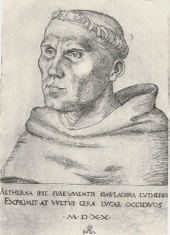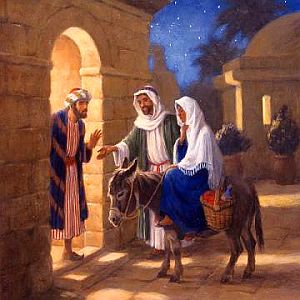With a split-up this epic, it’s a good thing kids or alimony wasn’t involved.
The Protestant Reformation, as it is with many great stories of history, began with one character. In this case, a monk named Martin Luther.

Most Christians recognize Martin Luther and his famous “The Ninety-Five Theses,” however what may come as a surprise is the nature of the movement’s eventual break from the Catholic Church.
His objections began in October of 1517 when Martin Luther, a monk at the time, heard from local parishioners that they no longer needed to repent for sins due to “plenary indulgences” they had purchased. Turns out earlier in the year prior, then Pope Leo X needed extra cash to rebuild St. Peter’s Basilica in Rome, so he came up with a plan: sell indulgences and use the proceeds to fund construction. To make matters even more sketchy, Albert of Mainz, Archbishop of Mainz in Germany at the time, permitted the sale of these indulgences in his territory in exchange for a kickback to help settle his debt for securing the Archbishop position.
But what is an indulgence? Well, according to the ol’ Catechism…
“The remission before God of the temporal punishment due to sin whose guilt has already been forgiven(1471).”
In this way, God forgives us of our sins, however the temporal damage of such sin remains and can effect our daily lives. Indulgences from the Church call upon the merits of the communion of saints to clear these damages.
And so it was, that Martin Luther flipped out. He was livid that the Church was selling what was offered free to mankind through God’s grace (the Church had not sold these indulgences before).
Contrary to popular belief, the nature of the letter and Martin Luther suggests that he did not nail his famous objection to the door of the Castle Church of Wittenberg. The letter was written to the Archbishop of Mainz and the bishop of Brandenburg, not as a threat of rebellion, but as a scholarly objection to church practices (Hans Hillerbrand, “Martin Luther: Indulgences and salvation“).
Although Luther disagreed, he never intended (until much later) to break away from the Church and begin his own movement. Indeed, Luther wanted the Church to return to simple orthodoxy. The simple debate however, soon turned into a bitter and protracted battle of will and theological maneuvers. Within only two generations, all of Europe was divided–Protestant vs. Catholic. The reformation Luther initially envision turned into a full division in the church.
That said, Pope Paul VI said in the Second Vatican Council during the 1963…
“…in humble prayer, we beg pardon of God and of our separated brethren, just as we forgive those who trespass against us.“

The Protestant Reformation initiated nearly 500 years of splintering within the Church. According to the World Christian Encyclopedia, there are roughly 38,000 denominations within the Protestant umbrella. Most of them claim to have Christianity all figured out.
At the very heart of the matter, the Protestant Reformation represents the cost of corruption and egotism. As Pope Paul VI implied in his apology in prayer, fault rest on both sides. Like a married couple locking horns in an argument, neither side was willing to budge or even listen. The fight escalated until the original conflict festered and rebounded until there was little hope for reconciliation.
Who are the “kids” in this situation, the ones who often suffer the most in any split-up? I say it’s the Christians and searchers of the faith lost between denominations. It’s the folks who look left and right in search of the “true way” amidst all the fighting and debates. Some Protestants have converted to the Catholic Church and vice versa, but which one is correct?
I wonder, due to Luther’s original intent, if he would have done anything differently had he known the repercussions of his reform movement 500 years later. Would he be happy with the 38,000 denominations all claiming the truth? What id the Church at time would have corrected its sale of indulgences? Would there be a Protestant split today? We may never know.
What do you think about the Protestant Reformation? Is there any hope of a unified Church in the future?

